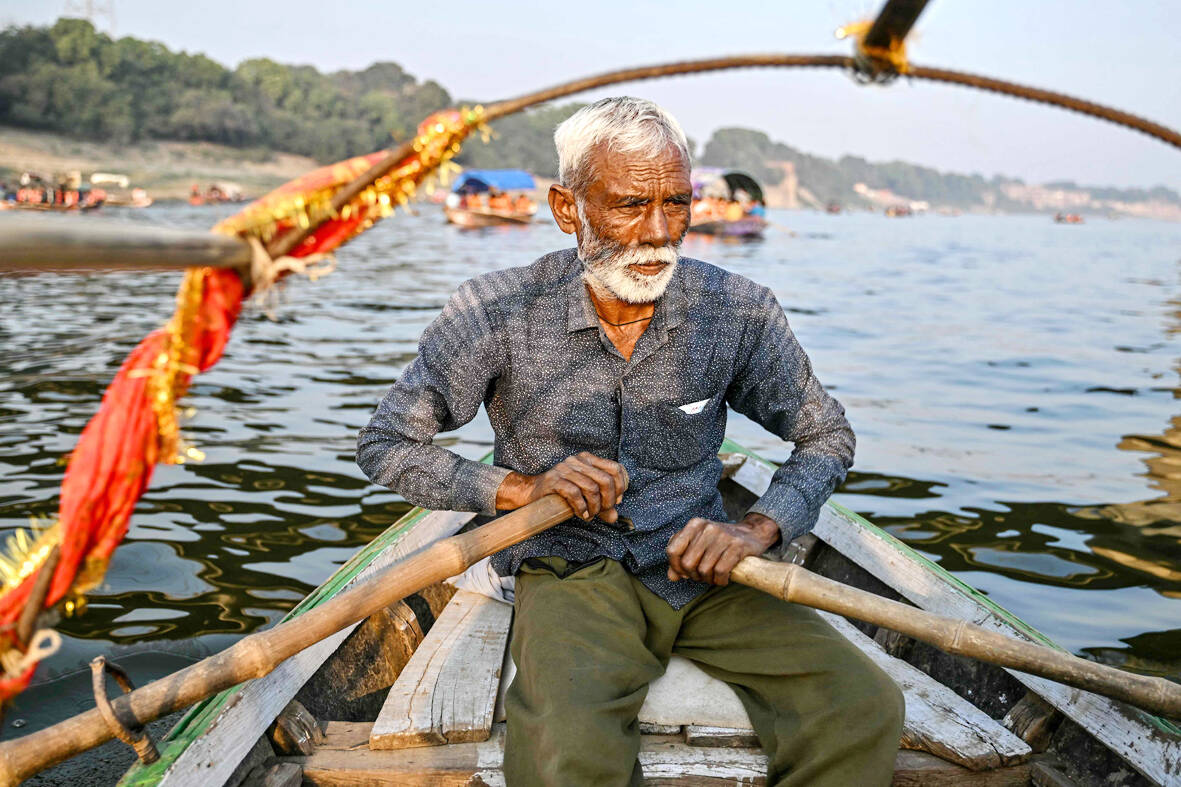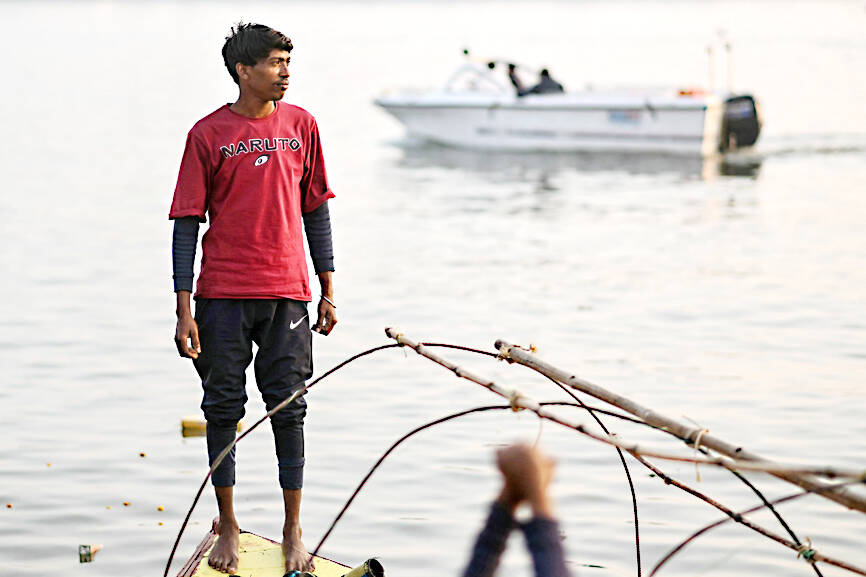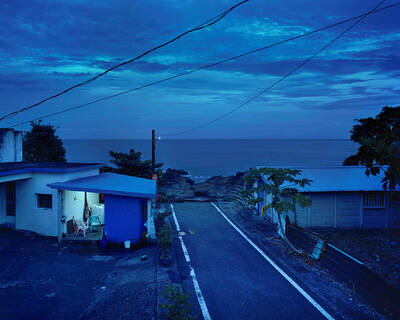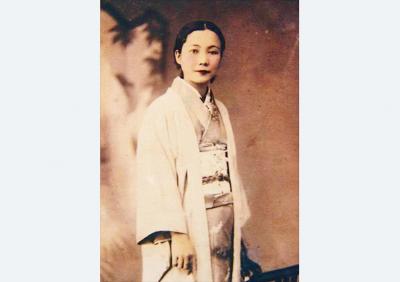For millions of Hindu pilgrims at India’s millennia-old vast Kumbh Mela festival, the culmination of their journey is ritual bathing in the holy waters where sacred rivers meet.
And for as long as anyone can remember, it has been generations of boatmen from the Nishad community who have provided the ferry service, rowing devotees to the holiest site at the confluence of rivers.
“We bring the devotees to the holy place in our boat,” said 52-year-old boatman Chhote Lal Nishad, returning after taking six pilgrims out on the water at dawn in his narrow wooden boat.

Photo: AFP
“We allow pilgrims to bathe with love and happiness and then return safely.”
Nishad boatmen say they are the proud inheritors of an ancient profession, not only transporting pilgrims but narrating the significance of the waters and the religious history of the Kumbh Mela.
With years of navigation experience, they often help rescue drowning bathers.

Photo: AFP
Hindus believe that those who immerse themselves in the waters cleanse themselves of sin, breaking free from the cycle of rebirth and ultimately attaining salvation. Nishad boatmen row the pilgrims throughout the year, but trade surges during the Kumbh Mela, a six-week-long Hindu celebration of prayer and bathing, held every 12 years, which runs until Feb. 26.
Tens of millions of people are attending the festival in the north Indian city of Prayagraj.
Viraj Nishad, 23, from the same community as Chhote Lal Nishad but no relation, is part of the new generation of rowers, carrying forward his father’s legacy.
“It is because of us that devotees can visit the holy site and take a dip in the river,” he said with pride.
‘JOY AND EXPERIENCE’
Normally, the boatmen take pilgrims to the heart of the confluence of the Ganges and Yamuna rivers, where Hindus believe the mythical Saraswati river also flows.
But the authorities have this year barred the boatmen from the busiest areas during the festival for safety reasons.
“The river is the only support for the Nishad community,” said Chhote Lal Nishad, who has been rowing pilgrims since he was a boy. “If there is no river we will die of hunger.”
“I had great hopes that I would be able to earn some money for the children,” he added. “That hope is shattered.”
Organizers say the scale of the Kumbh Mela is that of a temporary country, boasting that as many as 400 million pilgrims are expected to attend.
Last month, at least 30 people were killed and many more injured after a surging crowd spilled out of a police cordon and trampled bystanders.
The boatmen are still taking pilgrims to holy bathing sites, but slightly away from the confluence thronged with crowds.
They remain busy despite the restriction for many pilgrims say they prefer the traditional boats rather than larger modern crafts.
“The wooden boat moves slowly, and the joy and experience... is something which you cannot feel in modern boats,” said Ajeet Kaur Prajapati, 60, from the capital Delhi.
“The pleasure of eating food cooked by your mother is the same pleasure as traveling in a wooden boat,” she said.

A white horse stark against a black beach. A family pushes a car through floodwaters in Chiayi County. People play on a beach in Pingtung County, as a nuclear power plant looms in the background. These are just some of the powerful images on display as part of Shen Chao-liang’s (沈昭良) Drifting (Overture) exhibition, currently on display at AKI Gallery in Taipei. For the first time in Shen’s decorated career, his photography seeks to speak to broader, multi-layered issues within the fabric of Taiwanese society. The photographs look towards history, national identity, ecological changes and more to create a collection of images

A series of dramatic news items dropped last month that shed light on Chinese Communist Party (CCP) attitudes towards three candidates for last year’s presidential election: Taiwan People’s Party (TPP) founder Ko Wen-je (柯文哲), Terry Gou (郭台銘), founder of Hon Hai Precision Industry Co (鴻海精密), also known as Foxconn Technology Group (富士康科技集團), and New Taipei City Mayor Hou You-yi (侯友宜) of the Chinese Nationalist Party (KMT). It also revealed deep blue support for Ko and Gou from inside the KMT, how they interacted with the CCP and alleged election interference involving NT$100 million (US$3.05 million) or more raised by the

In 2020, a labor attache from the Philippines in Taipei sent a letter to the Ministry of Foreign Affairs demanding that a Filipina worker accused of “cyber-libel” against then-president Rodrigo Duterte be deported. A press release from the Philippines office from the attache accused the woman of “using several social media accounts” to “discredit and malign the President and destabilize the government.” The attache also claimed that the woman had broken Taiwan’s laws. The government responded that she had broken no laws, and that all foreign workers were treated the same as Taiwan citizens and that “their rights are protected,

March 16 to March 22 In just a year, Liu Ching-hsiang (劉清香) went from Taiwanese opera performer to arguably Taiwan’s first pop superstar, pumping out hits that captivated the Japanese colony under the moniker Chun-chun (純純). Last week’s Taiwan in Time explored how the Hoklo (commonly known as Taiwanese) theme song for the Chinese silent movie The Peach Girl (桃花泣血記) unexpectedly became the first smash hit after the film’s Taipei premiere in March 1932, in part due to aggressive promotion on the streets. Seeing an opportunity, Columbia Records’ (affiliated with the US entity) Taiwan director Shojiro Kashino asked Liu, who had